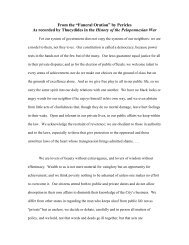Rousseau_contrat-social
Create successful ePaper yourself
Turn your PDF publications into a flip-book with our unique Google optimized e-Paper software.
the rights which are taken as being part of Sovereignty are really all<br />
subordinate, and always imply supreme wills of which they only sanction<br />
the execution.<br />
It would be impossible to estimate the obscurity this lack of exactness<br />
has thrown over the decisions of writers who have dealt with political<br />
right, when they have used the principles laid down by them to pass<br />
judgment on the respective rights of kings and peoples. Every one can<br />
see, in Chapters III and IV of the First Book of Grotius, how the<br />
learned man and his translator, Barbeyrac, entangle and tie themselves<br />
up in their own sophistries, for fear of saying too little or too much<br />
of what they think, and so offending the interests they have to<br />
conciliate. Grotius, a refugee in France, ill-content with his own<br />
country, and desirous of paying his court to Louis XIII, to whom his<br />
book is dedicated, spares no pains to rob the peoples of all their<br />
rights and invest kings with them by every conceivable artifice. This<br />
would also have been much to the taste of Barbeyrac, who dedicated his<br />
translation to George I of England. But unfortunately the expulsion of<br />
James II, which he called his "abdication," compelled him to use all<br />
reserve, to shuffle and to tergiversate, in order to avoid making<br />
William out a usurper. If these two writers had adopted the true<br />
principles, all difficulties would have been removed, and they would<br />
have been always consistent; but it would have been a sad truth for them<br />
to tell, and would have paid court for them to no one save the people.<br />
Moreover, truth is no road to fortune, and the people dispenses neither<br />
ambassadorships, nor professorships, nor pensions.<br />
3. WHETHER THE GENERAL WILL IS FALLIBLE<br />
IT follows from what has gone before that the general will is always<br />
right and tends to the public advantage; but it does not follow that the<br />
deliberations of the people are always equally correct. Our will is<br />
always for our own good, but we do not always see what that is; the<br />
people is never corrupted, but it is often deceived, and on such<br />
occasions only does it seem to will what is bad.<br />
There is often a great deal of difference between the will of all and<br />
20











